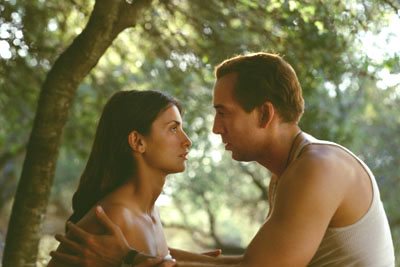
|
Captain Corelli's Mandolin
Review by David MumpowerSeptember 25, 2001
Captain Corelli's Mandolin is a very strange and disjointed film. Set on the Greek island of Cephalonia during World War II, the movie tells the story of Pelagia, a native whose father is the village doctor and a town leader. Their worlds are turned upside down when they receive word that the island is to be invaded by Italians so that the Axis forces may secure order and maintain supply lines for the Germans. When the Italian officer Captain Antonio Corelli arrives, complete with a mandolin strapped to his back, they realize their lives will never be the same. Based on a wildly successful book of the same title, the movie is not a direct retelling, since some events had to be reworked in order to be told in a reasonable fashion in roughly two hours. Corelli is played by Nicolas Cage, a fine actor who should never be allowed to attempt an Italian accent again. Pelagia is portrayed by the ethereal PenÚlope Cruz, and her father, Dr. Iannis, is played by John Hurt. The three are incongruous in their scenes together, as the doctor vacillates between showing concern for his country, care for his daughter and compassion for his invading counterpart. The mesh doesn't work, as the always-aloof Hurt is so withdrawn here that his actions are a complete mystery throughout the film. We never learn his primary motives, and even if we had, they wouldn't have mattered. His role is that of a watcher as his daughter falls for the enemy, in addition to being the de facto narrator about the status of the war. Other than that, his presence often borders on superfluous. For the purposes of discussion of Cage's performance, we'll completely ignore the accent. Yes, it is Jodie Foster in Nell/Kevin Costner in Robin Hood levels of terrible. Acknowledged. Let's just move on. Cage himself is quite charming here, and the reason why is that the character he plays is truly marvelous. In a time of horrific struggles and inexplicable deaths, he chooses to celebrate love, children and music and even manages to do it without seeming to be fake and/or transparent. It's very hard not to like the guy, and this is well displayed throughout the film, as the natives who want to hate their oppressor can't help but be charmed by this fascinating stranger. Particularly noteworthy are his interactions with Mandras (Christian Bale), Pelagia's betrothed and a military leader in the island's resistance movement. His grudging reaction upon first meeting Corelli signals they'll be enemies till the end, but even he finds himself won over by the innate decency of the good captain at different points. Similarly, Pelagia's scenes with Corelli begin with righteous indignation as she curses the outlander for his oppressive dogma, but then starts to warm to him once she realizes he does not believe in the professed ideals behind the war but instead serves his country out of civic duty. He's the best fascist ever! OK, that was harsh, but their love is as tender and sentimental as you'd expect from a film directed by John Madden, the man behind Shakespeare in Love. Particularly entertaining is the scene involving a dance thrown by the Italians for their "hosts", where Pelagia swoons when she hears the good captain play a mandolin piece written especially for her. For silly romantics such as myself this is good stuff, and had the film continued on in this mold, I would have highly recommended it. Unfortunately, the problem with setting a movie in a time of war is the inevitable combat sequences. In the case of Captain Corelli's Mandolin, the effect can only be described as taking the first 75 minutes of Notting Hill and then randomly throwing in the Normandy invasion sequence from Saving Private Ryan. The change in tone is that dramatic, and while I appreciate that there is a need to not shy away from the battles, the sheer volume and duration of those sequences is chaotic and honestly unwelcome. They do not fit the tone established early on, and so the dissonance is that much more evident. Even if you go in braced for the violence, I still fervently believe you'll walk out of the theater going, "What was that?", and that goes triple for a sequence in the climactic battle scene. A decision was made to try to blend the horrors of war with the natural beauty of romance, and while this has been done and done well before, in this instance it falls flat, as the movie is torn between conflicting themes that it never properly dissociates from one another. Captain Corelli's Mandolin is based on a wonderful story full of power and emotion, and some of that energy naturally carries over to the big screen; however, holes from the book are magnified by the time constraints of a motion picture. Also, the violent change in tone, while arguably crucial to the overall theme of the film, is so overblown in nature and indifferent in execution that I was irrevocably turned off as a viewer. Considering the ending given by the director, I don't think this was the desired goal, so I can't help but consider the film as a whole a disappointment. |
Friday, January 23, 2026
© 2006 Box Office Prophets, a division of One Of Us, Inc.